On January 20, I went to Washington, D.C looking for hope. President Donald Trump has inherited a divided nation, and one that is largely against him. America’s split was obvious on inauguration weekend—the presidential festivities were marred by protests and upstaged by the Women’s March a day later. Reconciling this divide is frustrating work when both sides suffer from tunnel vision. Trump and his supporters are often demonized by the left, the pain and fear felt by Clinton voters ridiculed by the right.
What’s often missing amid this turmoil is grace—the grace necessary to consider the humanity of the opposition. I asked attendees at the presidential inauguration and protesters at the Women’s March the same three questions: Why are you here? What is one hope that you have for the next four years? What will you do to help make that hope a reality?
My aim was to create a space for people to reflect on what this presidency means to them not as ideologues but as workers, parents, spouses, veterans, teachers, caregivers, LGBTQ people and allies, and above all, as Americans. Here are their stories.
Emily Neal and Jeanne Bayless (Texas)
Presidential inauguration
Why are you here?
Jeanne Bayless: We wanted to see D.C.—Emily’s sponsoring a Girl Scout group coming in March. And so then we said “Well we’re gonna go for the inauguration!”
Emily Neal: We’re really happy to be here.
Jeanne: Making history. And we’re behind Trump all the way! We think that all good things are happening.
Emily: We have a lot of faith that he’ll do well for our country.
What is one hope that you have for the next four years?
Jeanne: That we can be a great nation like we were before. We have hope for the future that we’re going to be strong in business, our military’s going to be strong, we’re going to be a light to the world like we’ve been in the past. We want to gain back the ground we feel like we’ve lost.
Emily: My greatest hope is that our country will return to God once more and become a very reverent nation. Another hope is that we’ll all go back to work.
What will you do to help make that hope a reality?
Jeanne: Get involved with who our leaders are and let them know what the people want.
Emily: Continue our church work, continue reaching out and doing work in our community.
Jeanne: Trump’s a real inspiration to me because I think the Silent Majority has been silent because we’re polite and we’re not militant. I think he’s given us the courage to stand up for what we believe in. Even though the media’s against the message. He’s a great spokesman for a lot of us that have been quiet.
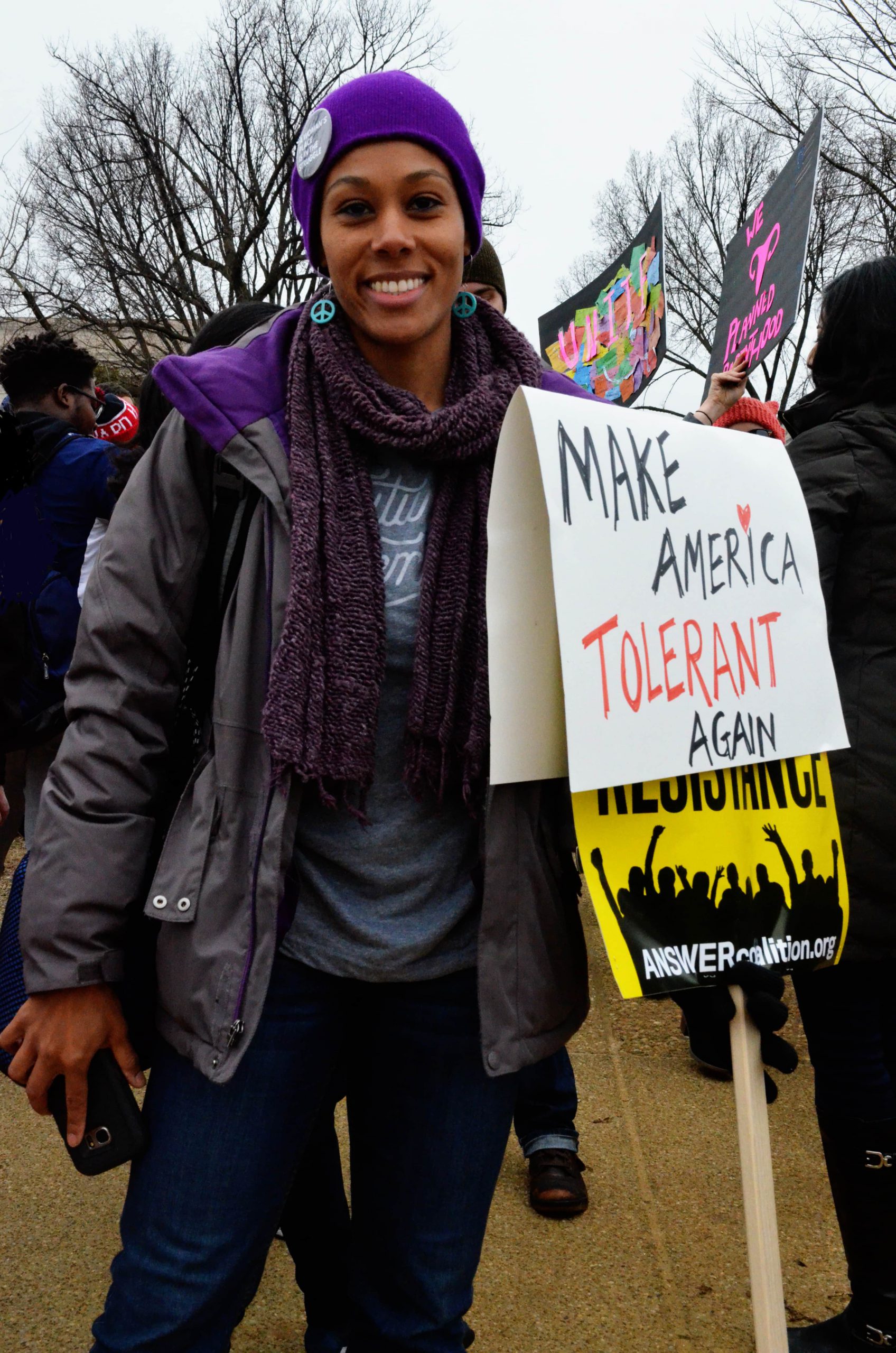
Adria Crutchfield
Adria Crutchfield (Brooklyn, NY)
Women’s March on Washington
Why are you here?
Two big concerns of mine are related to environmental justice and reproductive rights. That’s what I’m most fearful of under the Trump administration, amongst lots of other things, but that’s what brought me out today.
What is one hope that you have for the next four years?
It is hard to be hopeful. I think today is representative of folks of different coalitions coming together. That is what it’s going to take over the next four years to resist. I’m hopeful for that. Hopeful for uniting all different causes.
What will you do to help make that hope a reality?
I’m going to use my pocketbook, for sure. I’m fortunate enough to have a good job and a good salary so I can donate to the causes I care about. I’m going to be organizing a fundraiser for reproductive rights. Those are some things I’m doing right away. I’m sure I’ll be at future protests. I’m sure I will be heeding Michael Moore’s “Hundred Days” request to call your member of Congress every day on the variety of issues that we have to protest against.
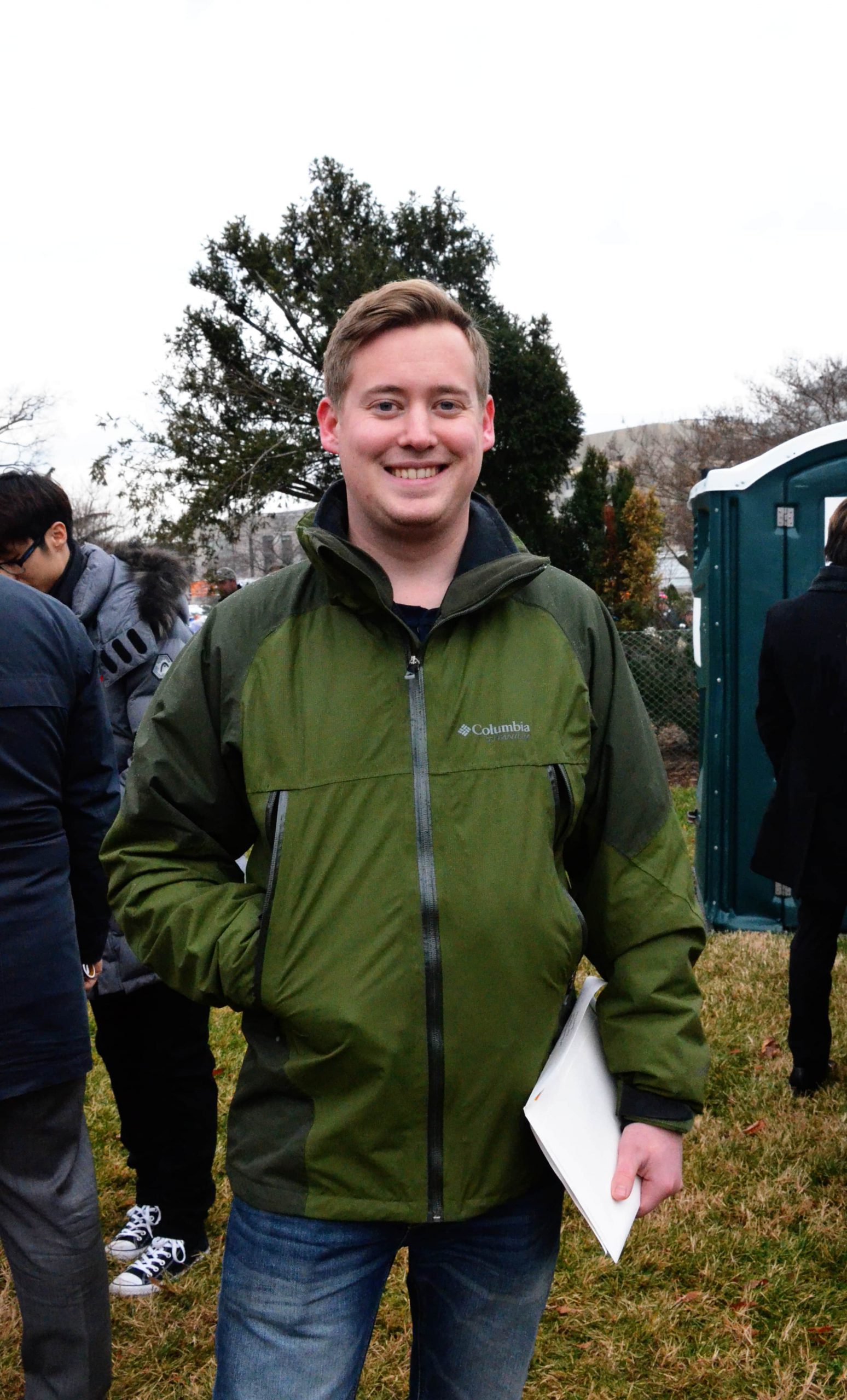
Erik Roan
Erik Roan (Salt Lake City)
Presidential inauguration
Why are you here?
I’m a Hinkley intern, interning on the House Committee on Oversight and Government Reform with Jason Chaffetz. Trump wasn’t my favorite or first choice, but he’s the President so I’m happy to show my support for him and wish him the best.
What is one hope that you have for the next four years?
I hope we can come together a little bit more as a country. I think things are a little divided right now. We need to get our heads on straight again to work towards a common goal and understand that while we may not agree on the methods by which we get to that goal, we all have the [country’s] best interest at heart.
What will you do to help make that hope a reality?
Be as civically engaged as I can be and help others get civically engaged through working on campaigns, especially at the local level and getting good people involved in politics. The real decisions are made and are brought to pass through the local governments. If we can get people started at that level and get them involved then we’ll get some real decisions made and move from there.
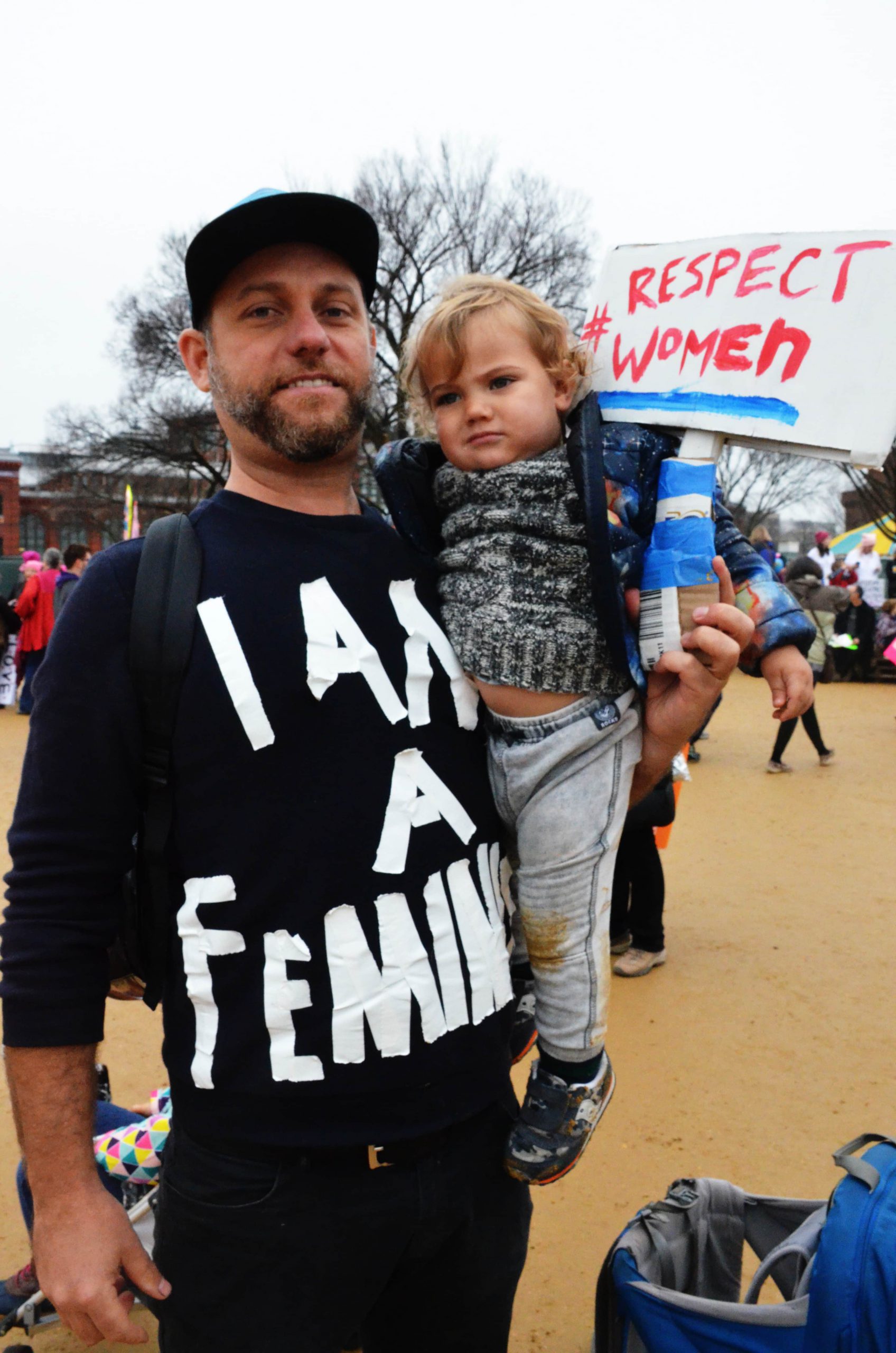
John Drew with his son
John Drew (New York)
Women’s March on Washington
Why are you here?
To stand in solidarity with women, immigrants, people of color, anybody that feels marginalized by the rise of this new president that we have, his party, and the bigots, the racists, the people that have come out in support of hate speech, the people that have come out through acts of violence, through acts of hate speech. It’s really important to our family, because I’m here with my one and a half year-old son and my three year-old daughter and my wife, to showcase our values and to stand up against values that impinge on other people’s rights and their right to feel like they’re respected. There was an insane amount of disrespect and continues to be a lot of disrespect coming from the president and from a lot of the people that he’s chosen to associate himself with. It’s alarming and it’s concerning. I think this is an opportunity to stand with people that want to address these concerns and make their voices heard.
What is one hope that you have for the next four years?
One of my greatest hopes is that this type of president will not be elected again. This is such a punch to the stomach in terms of the type of values that now represent this country. I think so many people are here right now because we’ve all been collectively punched in the stomach. The hope is that this is an opportunity to not let this ever happen again – [the election of] a misogynist, a hateful person, a person that is willing to abuse things like hate speech and be so careless and crass with, for example, how he behaves on Twitter. I hope we get better at organizing and that the grassroots work that has to be done to get better people in power really starts to take off now. That this becomes a galvanizing moment in American history. When you study history or hear people that thought during the Civil Rights era, it sometimes takes really dark moments to create more change and better opportunities. This is just another chapter in that.
What will you do to help make that hope a reality?
I’m going to get involved in local politics in a way that I have never done before. I’d maybe consider running for local office. I speak Spanish and I have deep ties with the immigrant community to I’m going to try to leverage my white skin, my ability to speak two languages, and my progressive politics to bring some new, young blood into my local town board and go from there. Starting small. Other than that, make sure that we’re supporting Planned Parenthood when we can, supporting NPR when we can, talking to our children every day about the things that matter. Getting them to be exposed to the good values – human rights values. I’m a teacher, so certainly having really deep conversations with my students—specific conversations, precise conversations, organizing in the classroom, so to speak, doing a lot of extracurricular event with my students, getting them to do local organizing and being a part of that, reaching out to old friends that I haven’t connected to in a long time and trying to energize the network a little bit in a way that I haven’t done for a while. Unfortunately, we took Obama for granted. It is easy when you have two young children to get stuck in your own routine and to let your own basic needs dictate your daily agenda. But while we were sleeping and raising our children, somebody snuck into the White House. I feel like now is a really good time to wake up and be as active as I’ve ever been, return to my roots. I’ve been to many many protests here in Washington but it’s been a while. It’s good that we’re here.

Asma Kari (left) and Brian Afeltra
Asma Kadri (Washington, D.C.) and Brian Afeltra
Women’s March on Washington
Why are you here?
Brian Afeltra: I’m here today to contribute my voice to all the women and everyone else that is here to support equality for everyone.
Asma Kadri: I’m here because I hope that this event is the starting of changing the dialogue. I hope that people notice how many people came out, what they’re saying, what they’re here for, who they’re here for. I hope that we can start shifting the conversation.
What is one hope that you have for the next four years?
Brian: I hope that these kind of events can keep happening with the same enthusiasm and the same vigor and that people in Congress will start listening to our voices.
Asma: I hope to help change the conversation. I hope that these things keep happening, not just for the sake of showing up and taking pictures, but for actual, positive change to keep happening.
What will you do to help make that hope a reality?
Brian: Show up to all those events!
Asma: Apart from attending these rallies and helping organize them, progressing the dialogue involves volunteering at a really local level, because that’s where change actually happens. I’m going to volunteer everywhere I can, specifically for domestic violence survivors and women’s shelters.

Robert Leech
Robert Leech
Presidential inauguration
Why are you here?
I’m here because Mr. Trump represents change in this country.
What is one hope that you have for the next four years?
I’m hoping to see a political change where people can work together to get things done. I’m hoping for a change—an economic change—and I think he’s the man to do it because he’s a political outsider, so he doesn’t owe anybody anything. The system as it’s been for the last eight years has not accomplished anything. Nothing. Zero. In order for us to be a strong country we need a common language, a strong military, and a strong economy. We don’t have either right now.
What will you do to help make that hope a reality?
I started out by voting. We’ll see what happens. I’m going to support the candidate.

From Left: Krista Back, Amy Wall, Tracee Persiko
Krista Back, Amy Wall, and Tracee Persiko
Presidential inauguration
Why are you here?
Krista Back: Because it’s historical and we live here, so why not come and see it for ourselves, participate, and have stories to tell after.
What is one hope that you have for the next four years?
Amy Wall: That a Trump Tower doesn’t come out of the White House! I hope that our political system does what it’s supposed to do, that our checks and balances that are in place keep one man from having the power that I think some of us fear he’s going to have.
What will you do to help make that hope a reality?
Krista: I [will] continually voice perspective. It’s easy to just get swept up in the hype of “he’s the best or the worst thing ever”. There’s a longevity to our country so there’s a perspective that goes beyond this one person or this one election.
Amy: We’re going to create dialogue all the time. We’re going to have four years of lots of talking.
Krista: Hopefully less anger.
Tracee Persiko: And I think just continuing to pray.

Nora Brennan with her niece
Nora Brennan (Saratoga Springs, NY)
Women’s March on Washington
Why are you here?
I’m here to stand up, to be a visible presence, to resist against the Trump agenda. There are so many issues we’re trying to stand for here, and I’ve been struggling to pick just one. So standing here to say that we are not going to be quiet, that we are going to stand up for what we believe in, whether it’s climate change, health care, women’s rights, equality for people across the country, freedom, the ability for our nieces to go to the pharmacy and get a prescription because she’s a woman and she’s got to get what she needs. That’s what I want to show [by being] here. For me this is an extension of the work we’ve started doing since the election.
What is one hope that you have for the next four years?
I hope that we all learn that we can’t be complacent when things are good, that we have to stay involved and we have to individually rise up as citizens and always be using our voice, whether we like our president [or not]. [We need to] learn to work with our representatives.
What will you do to help make that hope a reality?
We started a local group called Saratoga Action after the election—a small group of women in the community—and we’re looking for ways to take action. I’m planning on working with that group, working locally to do volunteer work, to get to know my representatives. Maybe I’ll run for office, maybe not. But also making sure that I’m locally trying to make a difference and hopefully that will have a broader impact as well.

From left: Mark Millard, Kaven Laurenitis, Michael McGinley, and Brian Rienecker
Mark Millard, Kevin Laurenitis, Michael McGinley, Brian Rienecker
Presidential inauguration
Why are you here?
Support Trump! Support Trump and the country. I have a fundamental disagreement with how things have been going the past eight years. Under Obama [there was] increased regulation and increased taxes. As a millennial I’d like to keep a little more of my paycheck. Keep America safe with a strong military. Less political correctness. I think someone who has done what Trump has done will be very helpful for America—get the political hack out of there and drain the swamp!
What is one hope that you have for the next four years?
I’d like to see a lower income tax. I’d like to see the economy continue to grow. I’d like to see immigration reform change from what it’s been the last eight years. I’d like to see the country move in a good direction.
What will you do to help make that hope a reality?
Pay taxes and open the dialogue. Interact with people and try to have a legitimate conversation with about differing opinions so it doesn’t get so heated and personal. America has to heal after this campaign season. I think a lot of people who didn’t believe in Trump will be pleasantly surprised. I will support the people we’ve elected and put into these positions to run our country. Continue to support our president and our congressmen and hold them accountable … to those platforms.
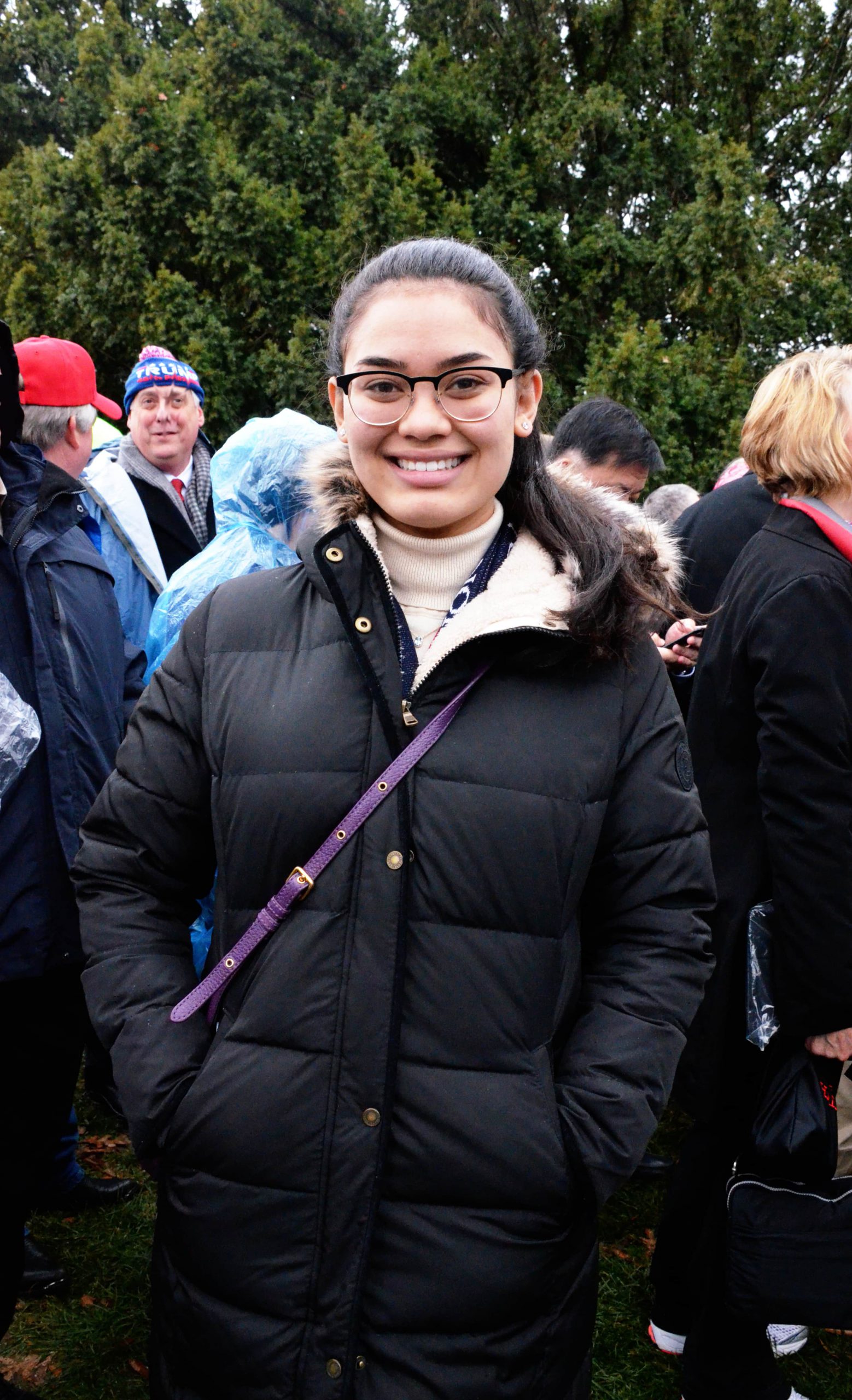
Emily Jones
Emily Jones (Saipan)
Presidential inauguration
Why are you here?
I go to school at American University, so I live here. I wanted to come to the inauguration first of all because I think it’s an experience that you can’t miss out on. Some big things are happening in the country and I thought that I would come see it first hand. It’s a big moment in history. I was invited by the governor of my island and I thought it would be a special moment to experience.
What is one hope that you have for the next four years?
My biggest hope is that America won’t be as divided anymore. I do hope that all of the unity I’m seeing right now can translate, in the next four years, such that all of this can be put to good use and that all the things that the president-elect is saying will be for the good of the country.
What will you do to help make that hope a reality?
There are definitely a lot of things. Vote. Use the right to vote. In the next four years I’m definitely going to be more open to listening to more people and just making sure [we have] needed discussions about politics. At my school it’s very common—AU is the most politically-active school in the country. I think that it’s important that we listen to each other in order to be united. It’s really difficult to do that if everybody is so headstrong in their opinions without listening to others. It’s important to be able to listen to both sides.

Ben (left) and Sally Weiss
Sally Weiss (Waynesville, NC) and Ben Weiss (North Chevy Chase, MD)
Women’s March on Washington
Why are you here?
Sally Weiss: I’m here because it’s really important to stand for women’s rights and to say “We are women, we are watching, there are things that are important to us, we will take action.” It’s really important to me as a person with a disability. I’ve worked with the disability community [at the] Southeast ADA center, and we talk about [the rights of] people with disabilities. Our job, when the ADA was passed 25 years ago, was to reach out to people with responsibilities under the law so that, as a person with disabilities, I don’t have to fight every single day to get my rights. We talked to cities, stores, whatever, and tell them “this is your responsibility”. It was really important for me to wear this shirt and remind people that the disability community makes up about twenty percent of the population when you add our families to it. I want to stand up and be counted.
Ben Weiss: Human rights are important, and working to ensure everyone has equal rights is important. Any issues that affect women’s rights and actively take away from them should be addressed.
What is one hope that you have for the next four years?
Sally: Where I live is near Asheville, North Carolina, which has been called by one of the Republicans, the “cesspool of sin.” We’re very proud of that. Peter Siegel liked it so much that he did commercials for our local NPR stations. We have always stood up for human rights, for people with disabilities, for people of all minorities. They gerrymandered us, so they split our voting rights – the Republicans in our legislature. I’m here to say “You can’t do that any more.” That we have absolute rights. So I’m looking nationally, but I’m working locally. So if something comes up – in our case, in our little town – it’s the human rights for people who are from Mexico, who are here to work in our fields and our orchards. It [requires] people in the community to stand up, ask them what is needed, and then we say “how do you want us to help you”. You don’t come parachuting our middle-class, white values on them. Now my passion and my people are people with disabilities. It’s a matter of not letting [legislators] locally cut back on the money they give to special education for people with disabilities. That’s a major issue. As our Republican legislature cuts back funding to our schools, and then it trickles down, our school board has less money for taking care of kids who have individualized education programs. So my job is to go in and remind them that we vote, these kids are important, and that as a woman who no longer has children in the schools, [that’s where] I want my tax dollars to go. But it’s becoming visible in a very open, “I’ll listen to you, please listen to me” way. That’s my plan for this year.
Ben: I hope that things that are projected to happen regarding the environment, regarding the rights of men, women, and children in the United States, don’t come to pass. Some of it’s campaign promises, some of it’s the President’s sensibilities, some of it is the Republican congress working with the president on corporate takes cuts or something like that. There are a whole slew of changes that they’re talking about doing, so my hope is that some of those don’t come to pass.
What will you do to help make that hope a reality?
Ben: Locally, I’ll pay attention to local candidates and try to support and volunteer for those candidates who I support. Maybe that means writing in state senators because states’ rights are becoming important now as a block against federal action, supporting state representatives and state senators. You can still do stuff on the federal level too to increase democratic participation among communities who aren’t actively voting. There are local ballot initiatives. There’s a lot of stuff that’s going to shift back to the states to battle. So there are a lot of state-level democrats that are going to need support running for office, in places like Kentucky and NC.
Sally: Before Ben was born, his father and I were living in Boston [in the 1960s] and a woman named Louise Day Hicks made it okay to be an overt, active bigot. She was running for office in Boston. It’s a very divided city, anyway. There was one picture of a man [who] took an American flag pole and was beating a black man—a white man was beating him—and she said it was okay. I heard Trump do the same thing. It was okay to be bigoted. So we’re standing up—groups of us—Unitarians, Quakers, liberals, progressives, we’re standing up and saying “No. that’s not okay. You can’t do that.” Someone has to do it because the rhetoric that Trump chose to use meant it was okay to say things and do things like that. It’s not okay and we have to stand up and say that.
Ben: Be an ally when you can. If you see something, to say “Hey that’s not acceptable” or “why are you saying that.” Being an ally, surrounding yourself with allies, standing up against oppression when you see it. Being an example in your community.

Beth-Ann Jentile
Beth-Anne Jentile (Washington, D.C.)
Women’s March on Washington
Why are you here?
I’m here because I cannot believe that this country elected Donald Trump and I’m comforted by the fact that there’s so many people here who feel the same way. I’m very excited about the fact that it has united disparate groups and it reminds me a little bit of the protests in the 1960s. I was worried for awhile that people were getting too passive about political issues that they should feel strongly about. I think this has awakened the sleeping giant.
What is one hope that you have for the next four years?
I’m hoping that this is only the beginning of a major protest and resistance movement in the country. I think it’s time to do that. We can’t accept what is going to go on and what we already see is going on.
What will you do to help make that hope a reality?
One thing I’m going to do is I’m going to contribute to things like Planned Parenthood … SPLC … the ACLU, and the arts, because now it turns out that Trump might defund, if he can, the National Endowment for the Arts and Humanities. It’s kind of an incredible concept. We all have to do what we can, financially, to make sure that they have enough money to move forward on our behalf.

From left: Jimmy Bickel, Josh, Matt Julyan
Matt Julyan, Jimmy Bickel, and Josh (Arlington, VA)
Women’s March on Washington
Why are you here?
Matt Julyan: To support the movement going on, the general women’s rights and human rights approach of bringing everyone together for one cause, showing that we’re not down in the dumps as we may seem.
Jimmy Bickel: I think all of us are of a similar mindset of disagreeing with the state of how our presidential election ended, and we’re willing to join in the movement to make our voices heard against it.
Josh: And keep the elected officials honest.
What is one hope that you have for the next four years?
Matt: My hope is that no one feels marginalized. I think that’s important
Josh: If four years from now we don’t feel like we’ve taken too many steps backward as far as where we stand for human rights and accepting everyone for who they are, I would accept that as a solid victory.
Jimmy: My hope is that we avoid catastrophes in foreign relations.
What will you do to help make that hope a reality?
Jimmy: Stay more involved. I think the amount of people that have come out today, the day after the election, is pretty inspiring. Looking around and realizing that you’re not one in a million, you’re at home with other people who see that what’s going on is bad and they can become more involved. It’s good to see this many people out here.

Hannah (left) and Katie
Hannah and Katie (Kentucky)
Presidential inauguration
Why are you here?
Hannah: We don’t actually support Trump but we are here for the history of it, and [to see] the sights of D.C.
What is one hope that you have for the next four years?
Katie: I hope that we doesn’t put our country in a hole.
Hannah: I hope he doesn’t start any wars.
Katie: Unnecessary wars. I don’t know a lot about [this] stuff, honestly. I’m too young to know anything about politics.
What will you do to help make that hope a reality?
Katie: I’m going to write. I’ve been writing a lot. I wrote an essay about different things that should change—several essays.
Hannah: I films things so maybe I’ll make a film or a short story about some of my opinions.
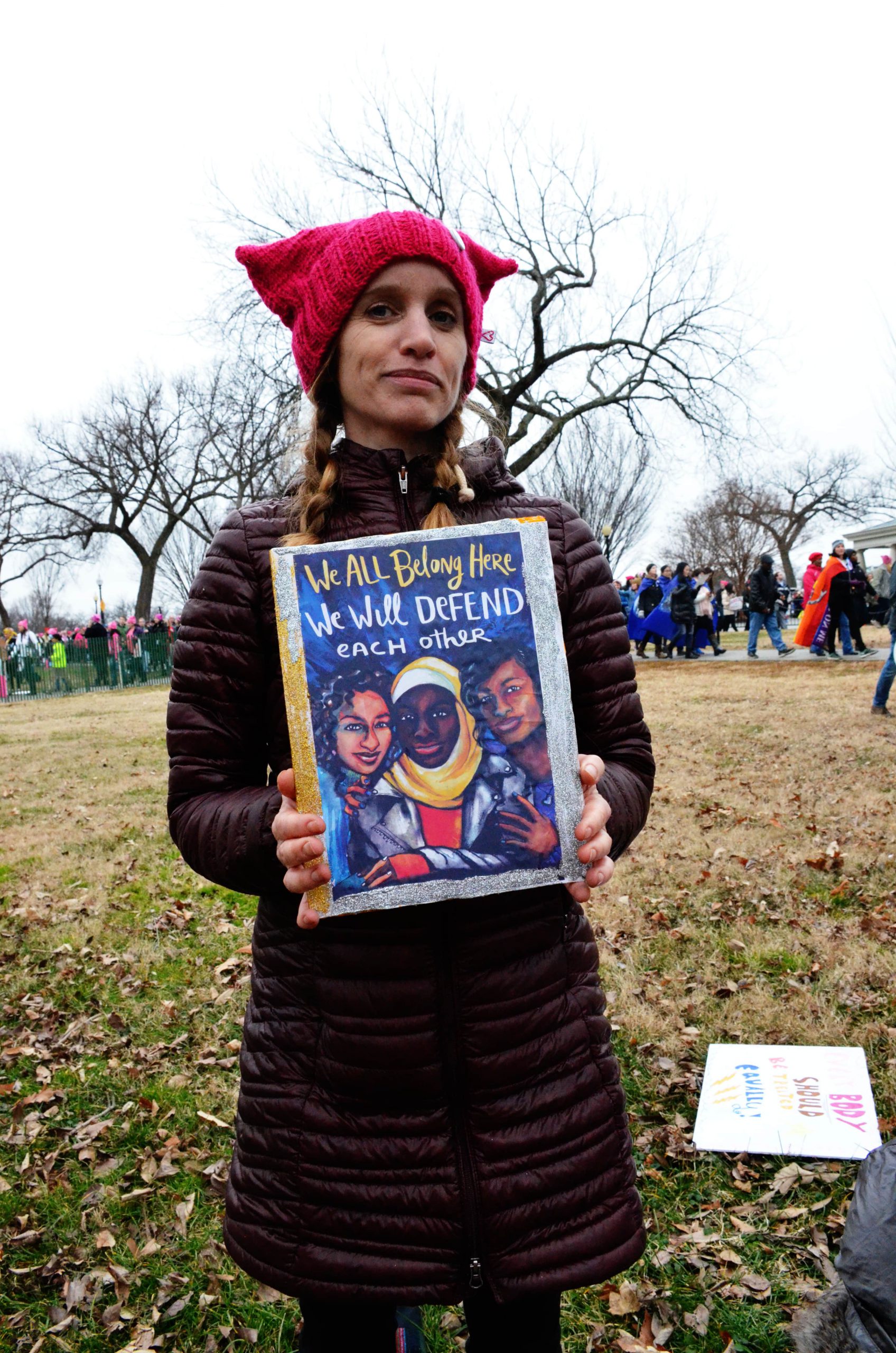
Caitlin McDonnell
Caitlin McDonnell (Brooklyn, NY)
Women’s March on Washington
Why are you here?
To be a part of a movement to fight against sexism and racism and xenophobia in this regime.
What is one hope that you have for the next four years?
I believe that this election was a symptom of a sickness in our culture and [I hope] that we’re really going to look at that sickness in our culture and that the resistance is going to be powerful and it’s going to wake a lot of people up.
What will you do to help make that hope a reality?
I will practice every day in small ways resisting by trying to live according to my values despite the way they are contradicted by the cultural and political messages being sent to me. I will keep coming out and I will stand up for people that are marginalized. I will stand up for people I see being harassed on the street. I will teach my child about racism and sexism and climate change.

Sophie Kossakowski
Sophie Kossakowski (New York, NY)
Women’s March on Washington
Why are you here?
I am here to protest our new leader, I don’t want to say President, Donald Trump, and completely insane policies – his racist, xenophobic, sexist, misogynistic, homophobic policies.
What is one hope that you have for the next four years?
I hope that we can come together. I feel like there’s so much division. I don’t want to say that in a hokey way, but I hope that people can come together against him and that Republicans can realize that he’s corrupt and take initiative there.
What will you do to help make that hope a reality?
I think going to protests like this is huge, obviously. Showing that we’re active and that we’re angry, getting the word out there, letting him know that we’re mad is very important. And educating people on social justice issues is so important because we’ve got all these people [saying] “The liberal snowflakes are crying.” They don’t understand why because they’re all rich and white and straight. Making sure that people understand what we’re fighting for.
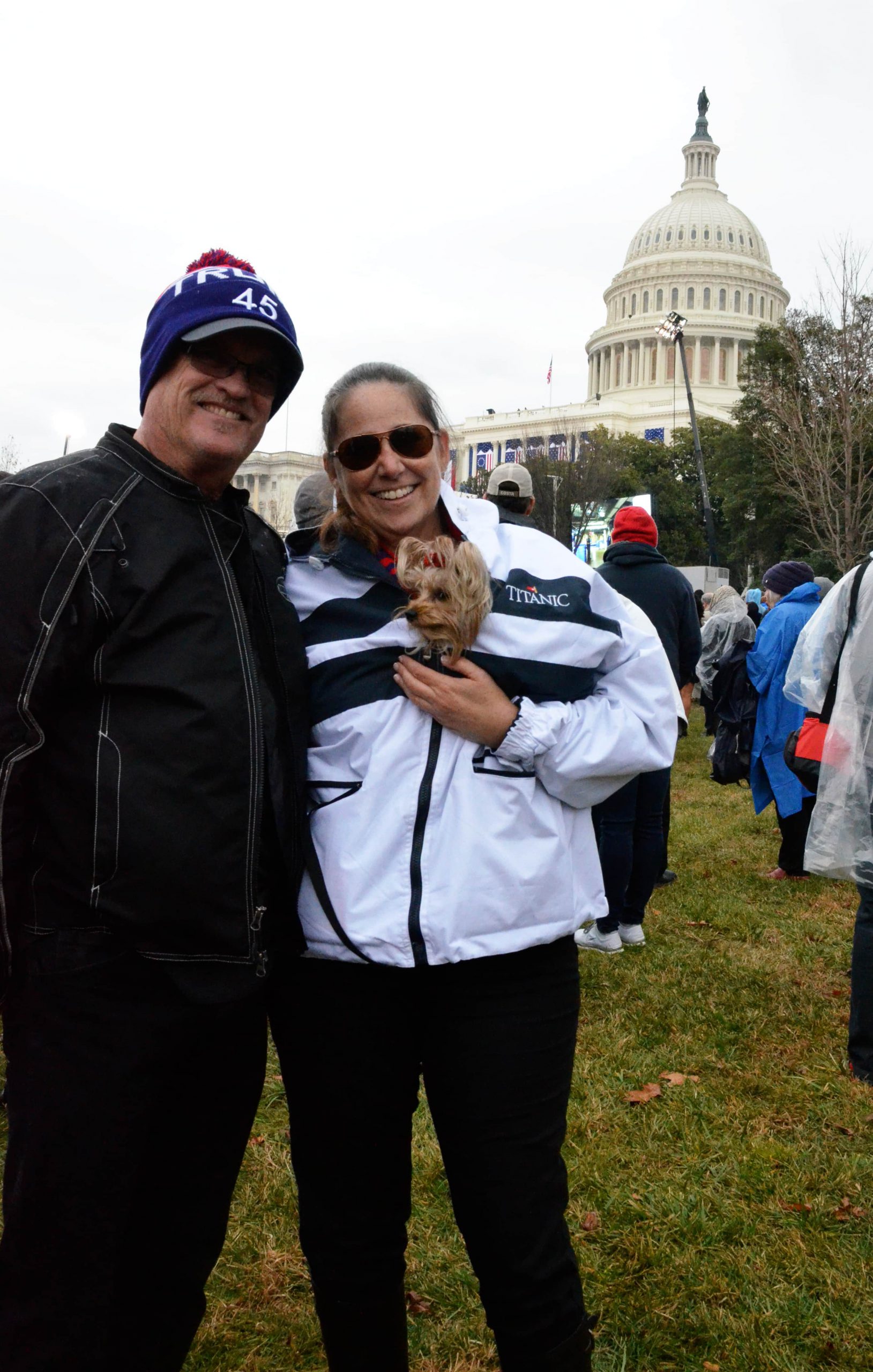
Patrick (left) and Amy Heavilin
Patrick and Amy Heavilin (Key West, FL)
Presidential inauguration
Why are you here?
To see Mr. Trump inaugurated into the presidency of this great country and we hope he makes it great again. We had to get rid of the old administration.
What is one hope that you have for the next four years?
Job creation.
What will you do to help make that hope a reality?
We just opened up my new CPA office two days ago. And we voted for Mr. Trump.
Interviews have been edited for length and clarity.
Photo credit: Chloe Lemmel-Hay/Harvard Political Review
